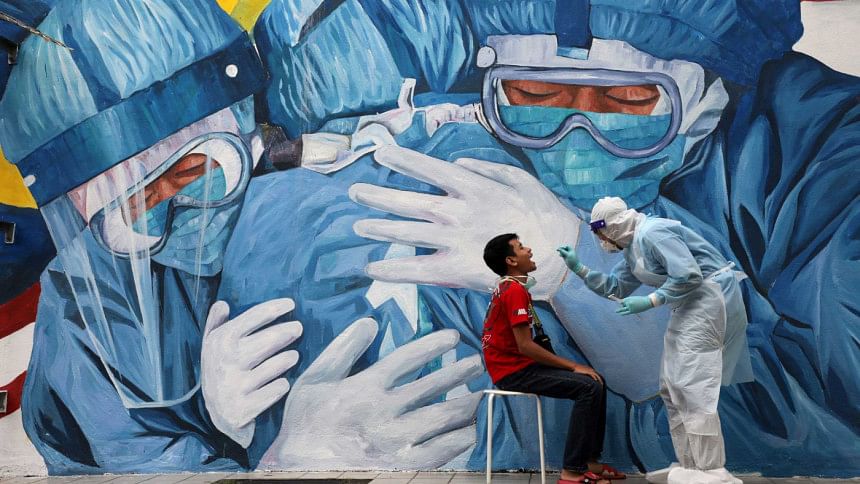After two years of Covid, what’s next?

For all of us around the world, the last two years have been rough because of the Covid-19 pandemic. As of March 24, 2022 afternoon, more than 476 million people have been infected by various strands of Sars-CoV-2. Globally, more than 6.1 million have died so far. The greatest toll—nearly 80 percent of all cases—has been among those 65 years or older in terms of cases, hospitalisation and deaths. Many of us have lost close family members. The trauma of the losses is still with us.
In recent weeks, when we have been experiencing a steady decline in Covid cases in many countries, with people coming out of the long "Covidian" hibernation, there still have been worrisome developments, such as the rising number of Covid cases in parts of the Asia-Pacific (Singapore, China, South Korea and New Zealand) and Europe (Britain, Germany and Italy), with the new surges largely driven by vaccine scepticisms. The latest Covid surge, according to the World Health Organization (WHO), is "the tip of the iceberg." So, even after two years of fighting with the pandemic, we are evidently not out of the woods yet.
The bottom line is, Covid is not going away, according to many experts. The vaccines and other treatments can keep future increases manageable. However, the biggest problem that remains is the millions of unvaccinated people—many of them by choice while others without access to vaccines—in much of Europe, Africa and the rest of the world. The two years of Covid have taught us some lessons not only about the coronavirus itself, but also about healthcare systems globally—how people and society have perceived this terrible disease and their responses, the sociopsychological tolls, the politics and backlashes against Covid restrictions, the astonishing vaccine nationalism, and, finally, how the pandemic wrecked and transformed the world economy.
An immediate lesson out of the pandemic showed how ill-prepared our global health institution, WHO, was. There was a major disconnect between what the world expected of WHO and its capacities and power to deliver—particularly its inadequate budget, which, strangely, is only one-fifth of the budget of the US Centers for Disease Control and Prevention (CDC). The fragility of public healthcare systems across the world became apparent, too, reaching their limits with shortages in every respect—from hospital beds and nurses/caregivers, to oxygen supply, medical tools and modern technologies—due to historic neglect. The situation was further compounded by pre-existing vulnerable and disadvantaged population groups, influenced strongly by the lack of access to health insurance and other social and economic factors, both in developed and developing countries.
The pandemic further exposed vulnerabilities in our society and accelerated the already existing inequalities in many countries, without any adequate social protection measures. As a result, the poverty-stricken and ethnic/indigenous groups, no matter where they live, have suffered the most. In many countries, the pandemic and the measures to fight it—for instance, periodic and/or prolonged lockdowns—led to mistrust in government, with the rise of anti-science populism, particularly in North America and Europe, despite the triumph of scientific and political leadership that so quickly developed and produced billions of vaccine doses. However, at the same time, we witnessed vaccine nationalism in many countries, with utter failure of the global leadership to distribute and ramp up enough supplies through the ambitious COVAX programme to the least developed and developing countries.
The pandemic forced us to be bunkered in our homes until now. As a result, the concept of the workplace changed—perhaps forever. Millions lost jobs during the pandemic; others were forced to work from home due to lockdowns and travel restrictions. Many with inadequate or limited home office facilities endured stressful and long hours of work at home, without any scope to relax and recover from Covid anxieties; others with good home office support (and without any parental responsibility) found benefits in working remotely. However, the shift to remote work completely changed the way we work and interact every day through endless and often poorly timed virtual meetings via Zoom, Microsoft Teams and WhatsApp, online lectures/seminars, and training, often harming our relationships with family members, friends and colleagues. This remote work style may ultimately lead to a "hybrid" model for work in the future.
Can we foresee a post-Covid future anytime soon? Expert opinions suggest that Covid is here to stay. Just like recent surges in several countries, the disease will likely continue in some form and keep on disrupting our daily life. Some scientists predict that Covid will become endemic—perhaps more in the form of a respiratory disease that would be regularly treated like influenza. In other words, we must be ready to live with it in the future. Until then, it would be wise to continue putting on masks and testing periodically as part of everyday life. We can only hope the dangers and disruption of Covid will ease soon.
Dr Mohammad Zaman is an international development specialist and lives in Vancouver, BC, Canada.

 For all latest news, follow The Daily Star's Google News channel.
For all latest news, follow The Daily Star's Google News channel. 



Comments